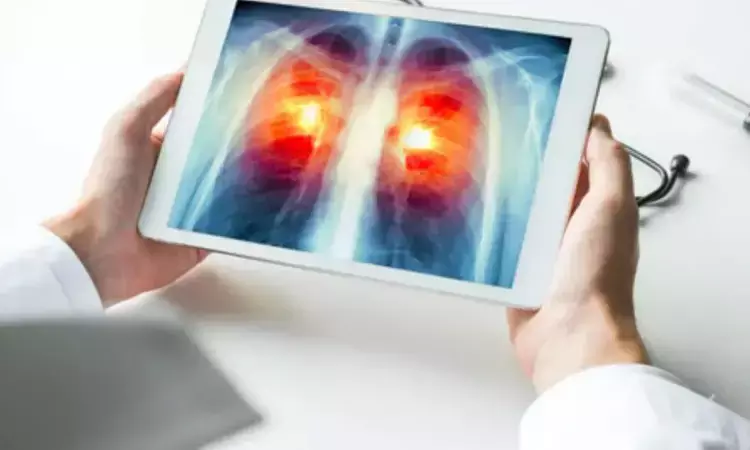- Home
- Medical news & Guidelines
- Anesthesiology
- Cardiology and CTVS
- Critical Care
- Dentistry
- Dermatology
- Diabetes and Endocrinology
- ENT
- Gastroenterology
- Medicine
- Nephrology
- Neurology
- Obstretics-Gynaecology
- Oncology
- Ophthalmology
- Orthopaedics
- Pediatrics-Neonatology
- Psychiatry
- Pulmonology
- Radiology
- Surgery
- Urology
- Laboratory Medicine
- Diet
- Nursing
- Paramedical
- Physiotherapy
- Health news
- Fact Check
- Bone Health Fact Check
- Brain Health Fact Check
- Cancer Related Fact Check
- Child Care Fact Check
- Dental and oral health fact check
- Diabetes and metabolic health fact check
- Diet and Nutrition Fact Check
- Eye and ENT Care Fact Check
- Fitness fact check
- Gut health fact check
- Heart health fact check
- Kidney health fact check
- Medical education fact check
- Men's health fact check
- Respiratory fact check
- Skin and hair care fact check
- Vaccine and Immunization fact check
- Women's health fact check
- AYUSH
- State News
- Andaman and Nicobar Islands
- Andhra Pradesh
- Arunachal Pradesh
- Assam
- Bihar
- Chandigarh
- Chattisgarh
- Dadra and Nagar Haveli
- Daman and Diu
- Delhi
- Goa
- Gujarat
- Haryana
- Himachal Pradesh
- Jammu & Kashmir
- Jharkhand
- Karnataka
- Kerala
- Ladakh
- Lakshadweep
- Madhya Pradesh
- Maharashtra
- Manipur
- Meghalaya
- Mizoram
- Nagaland
- Odisha
- Puducherry
- Punjab
- Rajasthan
- Sikkim
- Tamil Nadu
- Telangana
- Tripura
- Uttar Pradesh
- Uttrakhand
- West Bengal
- Medical Education
- Industry
Blood test may help determine if nodules detected by CT scans are lung cancer

Annual screenings of patients at high risk for lung cancer can catch tumors early and improve a patient's long-term prognosis. However, low-dose computer tomography (LDCT) has a high false-positive rate that can lead to unnecessary biopsies. University of Missouri School of Medicine researchers have found a biomarker in the blood that can complement LDCT by distinguishing non-small-cell lung cancer (NSCLC) from benign nodules without an invasive biopsy.
"It's a simple blood test that checks for two things: circulating tumor cells (CTCs) that detach from a primary tumor and circulate in the blood, and tumor-macrophage fusion (TMF) cells that have been determined to be highly prognostic for poor survival after lung cancer surgery," said study author Jussuf Kaifi, MD, a cancer surgeon at MU Health Care and an assistant professor of surgery at the MU School of Medicine.
Kaifi's team collected blood samples from 221 patients, including 90 NSCLC patients, 74 high-risk screening patients with either no or benign nodules and 37 patients determined to have suspicious nodules detected by LDCT. Researchers also tested a control group of 20 people who had never smoked who were at low risk for lung cancer.
"When we collected the samples from the patients in our study, we found CTCs in all 90 patients with NSCLC, none of the patients in the control group, and in 29 of 37 patients with suspicious nodules," Kaifi said. "We also found TMF cells in some NSCLC patients, and those were not present in patients with benign nodules."
However, Kaifi's team found that the rarity of TMF cells may make them unsuitable biomarkers for early cancer detection. Only 48% of patients with NSCLC tested positive for giant TMF cells. The next step is to conduct a prospective, large-scale, multicenter clinical trial to validate the role cellular liquid biomarkers play in improving diagnostic accuracy.
"This study demonstrated that integrating cellular liquid biomarkers, CTCs and TMF cells into standardized LDCT screening protocols can improve accuracy of NSCLC detection in high-risk patients who have nodules detected by LDCT," Kaifi said. "This is a promising finding that can potentially improve the screening process, improve cancer outcomes and reduce unnecessary interventions and associated morbidities."
In addition to Kaifi, the study authors include MU postdoctoral fellows Kanve Suvilesh, PhD, Yariswamy Manjunath, PhD, and Vijay Radhakrishnan, PhD; Jonathan Mitchem, MD, assistant professor of surgery; Eric Kimchi, MD, the John A. Growden Distinguished Professorship in Surgery; Kevin Staveley-O'Carroll, MD, professor of surgery; and Guangfu Li, PhD, assistant professor of surgery.
Their study, "Circulating Tumor-Macrophage Fusion Cells and Circulating Tumor Cells Complement Non-Small-Cell Lung Cancer Screeing in Patients With Suspicious Lung-Rads 4 Nodules," was recently published by JCO Precision Oncology. Research reported in this publication was supported by an Ellis Fischel Cancer Center Pilot Award and funding from the Department of Veterans Affairs. The content is solely the responsibility of the authors and does not necessarily represent the official views of the funding agencies.
Reference:
Yariswamy Manjunath, Kanve Nagaraj Suvilesh , Jonathan B. Mitchem, Diego M. Avella Patino, Eric T. Kimchi , Kevin F. Staveley-O'Carroll, Klaus Pantel, Huang Yi, Guangfu Li, Peter K. Harris, Aadel A. Chaudhuri , and Jussuf T. Kaifi
Dr Kamal Kant Kohli-MBBS, DTCD- a chest specialist with more than 30 years of practice and a flair for writing clinical articles, Dr Kamal Kant Kohli joined Medical Dialogues as a Chief Editor of Medical News. Besides writing articles, as an editor, he proofreads and verifies all the medical content published on Medical Dialogues including those coming from journals, studies,medical conferences,guidelines etc. Email: drkohli@medicaldialogues.in. Contact no. 011-43720751


